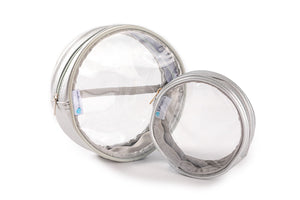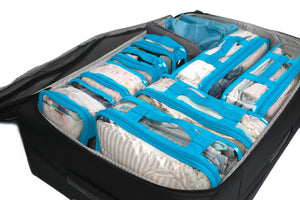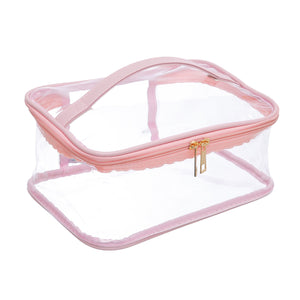Coronavirus and Travel Safety: Last Updated September 2023
Posted by Bea Manzano on
The year 2020 is off to a rocky start… One month into the new year, we’ve had to deal with natural disasters, political conflicts, deaths and just recently, a virus outbreak. Now, more than halfway through the year, there are more than 30 million confirmed cases of COVID-19 and more than millions of lives worldwide have been lost. It has affected and changed the world dramatically.
Given the pandemic situation, it’s natural to feel a bit scared and worried. After all, one of the industries that COVID-19 has impacted greatly is the travel industry. Now, as the world is slowly opening its doors to locals and tourists again, we know you still have a lot of questions that need answers. Should I postpone travel plans? How safe is it to hop on an airplane or go abroad? Don't worry, we’ll answer these questions and more below.
What Exactly is COVID-19?

COVID-19 is a new strain of human coronavirus. It was first identified in Wuhan, China although the exact source is still not known. It is different from the SARS and MERS coronaviruses but all three belong in the same group.
The symptoms of COVID-19 are similar to other flu-like viruses:
• Dry Cough
• Fever
• Shortness of breath
• Sore throat
• Fatigue (or general feeling of being unwell)
It’s important to note that the virus spreads through human to human contact - for example, when someone sneezes or coughs and passes on the droplets to another person in close proximity.
It could take years before a vaccine for the COVID-19 can be developed. Experts are currently racing to find a vaccine but even when researchers find a vaccine against the new coronavirus, it will take 12 to 18 months at best before it's ready to be distributed to the public. That’s why taking extra precautions is very important, especially if you’re traveling.
How to Travel Safely During a Virus Outbreak

Nonessential travel during the COVID-19 pandemic is currently discouraged by the Centers for Disease Control and Prevention (CDC) as it increases your chance of getting and spreading the coronavirus. For cases in which traveling can't be helped, here’s a few tips you must follow:
Before You Travel:
1. Stay informed - Read the latest news and be updated on the most recent travel advisories about your destination. The US State Department advises against non-essential travel to other countries.
The U.S. currently has the most number of confirmed COVID-19 cases in the world, with majority of the infected in California and a few surrounding cities. India, Brazil, Russia, and Peru follows. Coronavirus cases have been reported in over 200 countries, and only a handful of nations remain to be COVID-free.
2. Get the flu shot - It won’t necessarily protect you from the coronavirus. But it’s ‘added security’ especially for vulnerable individuals. At the same time, it’s easier to rule out the other viruses included in the flu shot in case you do get sick.

3. A strong immune system is the key - There’s no vaccine or cure (yet) so the best weapon against the virus is your body’s own immune system. Load up on healthy, nutritious foods, get enough sleep and exercise. You can also boost your immunity by taking vitamins or supplements before your trip.
4. Talk to your doctor - People who are at a higher risk - elderly, pregnant women, children, immunosuppressed - should consult with a doctor before pursuing travel plans.
Airplane Travel / Flying:
1. Check your destination's requirements upon arrival - As some countries have lifted their travel ban, most airports around the world have resumed international flights at a limited schedule. However, there are still some travel restrictions by country that you need to consider. Some countries require travelers to undergo quarantine upon arrival, some only require a negative COVID-19 test result. Be sure to check the travel restrictions the country you're visiting has imposed to be able to comply.

2. Be prepared for rigorous screening - Allot extra time for airport screening. Most airports have stepped up their screening processes like adding thermal checkpoints and interviewing international passengers about their travel history.
3. Pack your own ‘Hygiene Kit’ - Use our TSA Approved Toiletry Bag to pack your own sanitizing and hygiene products. Place the pouch in your carry on or airport tote.
Don’t forget to bring the following:
☑ Travel Size Hand Sanitizer - The TSA currently allows each passenger up to 12 ounces of hand sanitizer in their carry-on bags. This will be screened separately so expect a longer than usual security checks at the airport. Read more about this here.
☑ Sanitizing Wipes - For wiping handles and surfaces at the airport and on the plane before touching them.
☑ Digital Thermometer - For monitoring your temperature.
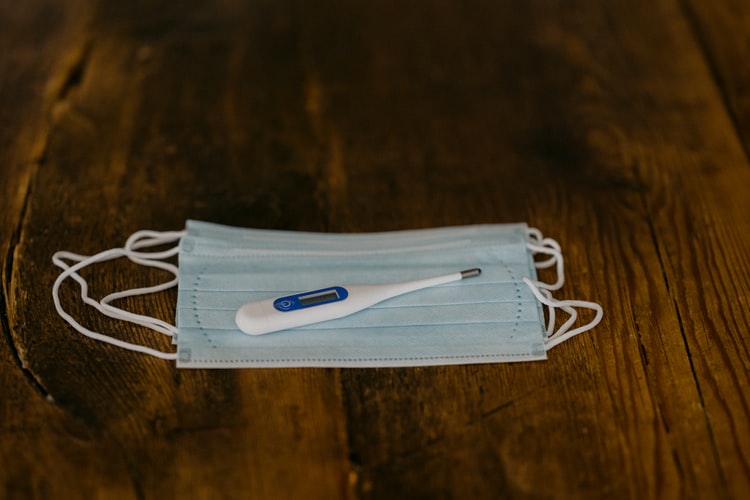
☑ Face Mask - Must be worn in public at all times. Children below two years old and those with breathing problems are exempted to wear masks.
☑ Travel Size Alcohol - Pack in a travel size spray bottle to make sanitizing and disinfecting hands and surfaces easier.
☑ Tissue - Bring a travel size pack that can be placed in your personal items bag for easy access.
4. Reduce your risk of getting sick on the plane - Some of the things you can do:
• Choose a window seat - According to this study, passengers in a window seat have the lowest risk of getting infected (i.e. being in contact with other passengers).

• Clean surfaces around your seat - Wipe down your tray table, arm rests, seat belt buckles, etc. as soon as you get on board. Use sanitizing wipes + alcohol!
• Make sure your area is well ventilated - Position the air vent so that it blows air away from you (in front of your head) and hopefully, directs the viruses and bacteria away.
• Maintain social distancing during flight. - Social distancing is difficult especially on crowded flights. Sitting within 6 feet of other people for hours may increase your risk of getting COVID-19. Avoid contact with other people that don't live with you as much as possible.

• Bring your own blanket and pillow - In flight amenities like blankets and pillows are often reused.
• Hydrate, hydrate, hydrate!
Health Practices for Your Destination:
1. Wash your hands often - Good hand hygiene can prevent the spread of infection. The CDC recommends washing your hands with soap and water for at least 20 seconds then drying them using tissue. If soap and water are not available, use hand sanitizer with at least 70% alcohol.
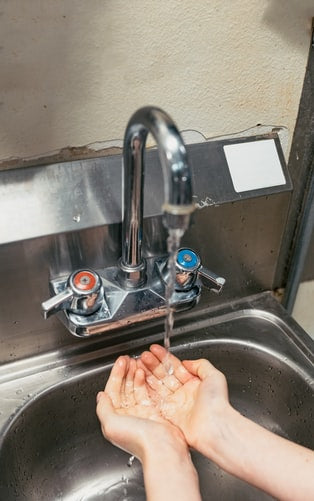
2. Avoid touching your face - Most viruses and bacteria enter the body through mucous membranes like the mouth, nose and eyes.
3. Sneeze or cough in tissues or into your elbow - These will keep your hands germ free! Also throw away the tissue immediately after using it.
4. Avoid high risk areas (i.e. wet market, farm, etc.) - Avoid visiting places where you’ll be in close contact with live animals. If you can’t avoid them, wear a face mask and wash your hands immediately after.
5. Use a face mask in public areas - It’s necessary to wear a mask when you're outside or in a public place, like malls or grocery stores. Also, learn the right way to wear and remove a face mask.

6. If you're feeling sick, isolate yourself. - Stay in a separate room and wear a face mask to avoid the risk of infecting others.
7. Know when to quarantine. - If you’re caring for a sick person or constantly exposed to infected patients (i.e. working at the hospital), know when to quarantine.
8. Hydrate - Drink a lot of water and avoid beverages like soda, coffee and alcohol.
9. Be prepared - Bring your own First Aid Kit and carry a hygiene kit with you at all times. Don’t forget to pack a thermometer, pain reliever meds and lozenges. If you’re not feeling well, cancel any travel plans and consult a doctor!
Going Back to the US:
1. Return restrictions - U.S. citizens and legal permanent residents returning from Brazil and Europe will have to travel through select airports with enhanced screening procedures. These airports are better equipped for epidemic emergencies. Travelers from China will be subject to screening and close monitoring (self quarantine) for 14 days.
2. Monitor your health closely - The incubation period for the virus is from 2 to 14 days after exposure. If you experience any of the symptoms within that period, call your doctor immediately. However, there's a possibility that you may feel well and not show any symptoms, but you can still be contagious to your friends, family, and community. You will pose a risk to the people around you for 14 days after you were exposed to the virus. Be sure to quarantine yourself during this period to avoid infecting those around you.
If you get sick after air travel, do the following:
✓ Stay at home and isolate. Avoid contact with others until you are well.
✓ Don't travel. Cancel all travel plans.
✓ Stay in touch with your doctor.
✓ Get emergency medical care immediately if you have emergency warning signs for COVID-19.
For more details about after you travel, visit CDC's website.
On Tours, Flights, Accommodations & Travel Insurance

Already booked a tour or paid for a hotel reservation? If you want to cancel any travel plans, the best thing you can do is to contact your agent and see what options you have. Most airlines have already announced that they’re waiving change fees and offering full refunds for flights into China.
Travel insurance is more tricky. If you’ve purchased a Cancel For Any Reason (CFAR) upgrade, you can receive a reimbursement around 50% to 75% if you cancel your trip. However, most insurance policies don’t cover epidemics or pandemics as valid cancellation reasons.
If you do get sick while traveling, your policy will cover any emergency medical expenses or evacuation situations. Still, it’s best to read your policy to know what are the inclusions and the exclusions.
The CDC recommends to delay or postpone your travel if you or any of your travel companions are sick, have suspected COVID-19 (even without symptoms), or have come in contact with someone who has COVID-19 in the last 14 days.

But if you are perfectly healthy and haven't been around with anyone suspected or diagnosed with COVID-19, then be sure to take preventive measures in order to protect yourself and others while traveling.
Please visit the CDC website for more updates and information.
0 comments


